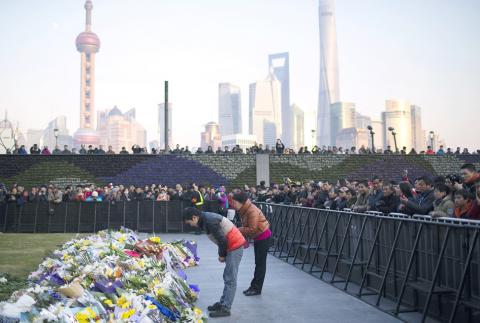China yesterday demanded a review of crowd-safety procedures as dozens of people remain in Shanghai’s hospitals after a deadly stampede on New Year’s Eve killed 36 and caused the cancelation of celebrations across the city.
At least 49 people were injured, including 31 still serious enough to require hospitalization, the Shanghai government said on its Web site. The stampede — the city’s deadliest disaster since 2010 — started at about 11:35pm, as tens of thousands of people crowded into the historic Bund riverside district for a light show.
Chinese President Xi Jinping (習近平) ordered an investigation and told local governments to prioritize safety ahead of the mass celebrations for the Lunar New Year holidays next month.

Photo: Reuters
The China National Tourism Administration issued an emergency notice on Thursday night requiring its local offices to establish procedures to control crowd flows at tourist spots.
While Shanghai authorities said they were still investigating the cause of the accident, eyewitnesses and family members of those injured described scenes where people were impeding the flow of traffic trying to escape the crowds, while others fell on top of each other at a pedestrian platform along the river.
Pictures posted on social media showed people that night packed tightly together in the Bund’s Chen Yi Square, where the incident occurred.
“This is a completely avoidable incident, as using today’s Internet and Big Data technologies’ early-warning mechanisms are completely feasible,” said Yi Peng, an urbanization researcher at Pangoal, a Beijing-based public policy research institute. “Doesn’t everyone in the area have a cellphone? Warnings could have been sent through Weibo, WeChat and all kinds of ways to avoid such a tragedy.”
The government blocked off an area at the Bund for people to lay flowers to mourn those who died in the tragedy.
It also made available a team of experts to provide psychological help to victims and families, according to its Web site and microblog.
The reason for the accident was still under investigation, according to staff at the Shanghai government media office who asked not to be named.
Four of the dead have yet to be identified, the person said.
Two-thirds of the fatalities were female, according to a name list posted by the government yesterday. Ages of the deceased ranged from 12 to 37, the list showed.
Shanghai party secretary Han Zheng (韓正) on Thursday said that the municipality would review the planning of large events, especially those in densely crowded places.

US President Donald Trump yesterday announced sweeping "reciprocal tariffs" on US trading partners, including a 32 percent tax on goods from Taiwan that is set to take effect on Wednesday. At a Rose Garden event, Trump declared a 10 percent baseline tax on imports from all countries, with the White House saying it would take effect on Saturday. Countries with larger trade surpluses with the US would face higher duties beginning on Wednesday, including Taiwan (32 percent), China (34 percent), Japan (24 percent), South Korea (25 percent), Vietnam (46 percent) and Thailand (36 percent). Canada and Mexico, the two largest US trading

AIR SUPPORT: The Ministry of National Defense thanked the US for the delivery, adding that it was an indicator of the White House’s commitment to the Taiwan Relations Act Deputy Minister of National Defense Po Horng-huei (柏鴻輝) and Representative to the US Alexander Yui on Friday attended a delivery ceremony for the first of Taiwan’s long-awaited 66 F-16C/D Block 70 jets at a Lockheed Martin Corp factory in Greenville, South Carolina. “We are so proud to be the global home of the F-16 and to support Taiwan’s air defense capabilities,” US Representative William Timmons wrote on X, alongside a photograph of Taiwanese and US officials at the event. The F-16C/D Block 70 jets Taiwan ordered have the same capabilities as aircraft that had been upgraded to F-16Vs. The batch of Lockheed Martin

GRIDLOCK: The National Fire Agency’s Special Search and Rescue team is on standby to travel to the countries to help out with the rescue effort A powerful earthquake rocked Myanmar and neighboring Thailand yesterday, killing at least three people in Bangkok and burying dozens when a high-rise building under construction collapsed. Footage shared on social media from Myanmar’s second-largest city showed widespread destruction, raising fears that many were trapped under the rubble or killed. The magnitude 7.7 earthquake, with an epicenter near Mandalay in Myanmar, struck at midday and was followed by a strong magnitude 6.4 aftershock. The extent of death, injury and destruction — especially in Myanmar, which is embroiled in a civil war and where information is tightly controlled at the best of times —

China's military today said it began joint army, navy and rocket force exercises around Taiwan to "serve as a stern warning and powerful deterrent against Taiwanese independence," calling President William Lai (賴清德) a "parasite." The exercises come after Lai called Beijing a "foreign hostile force" last month. More than 10 Chinese military ships approached close to Taiwan's 24 nautical mile (44.4km) contiguous zone this morning and Taiwan sent its own warships to respond, two senior Taiwanese officials said. Taiwan has not yet detected any live fire by the Chinese military so far, one of the officials said. The drills took place after US Secretary